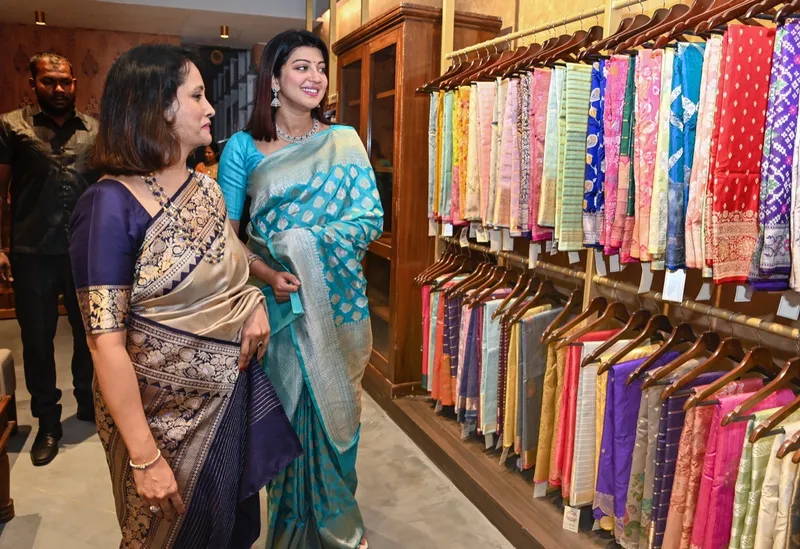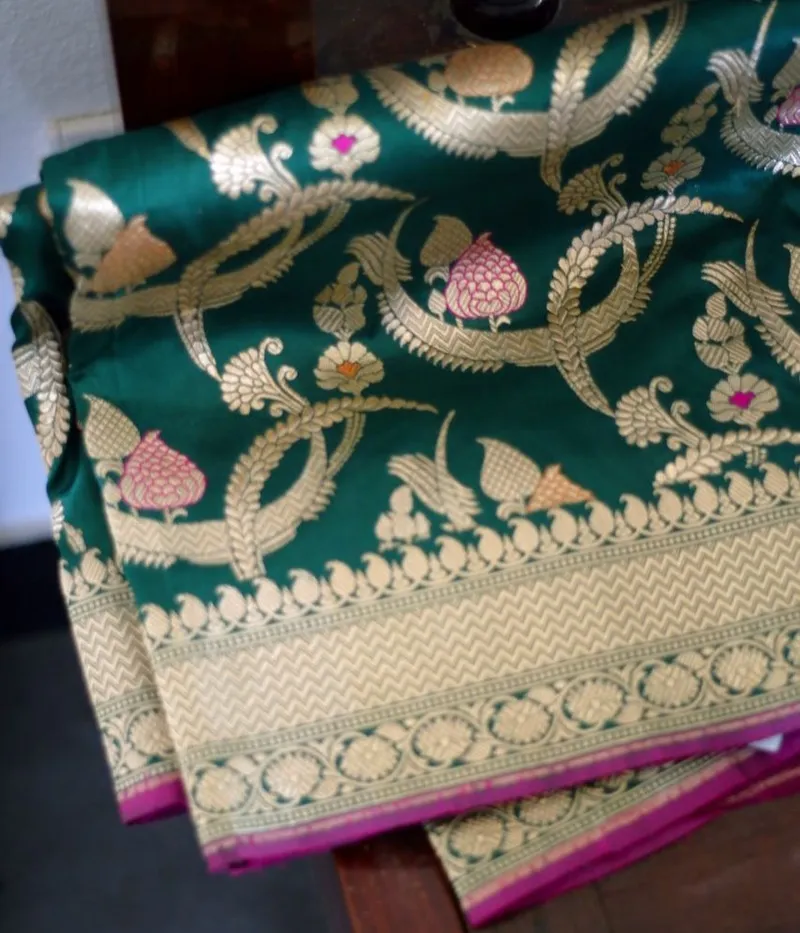How this ISB graduate prioritised her passion for Banarasi sarees over a fat cheque
In a Kanchipuram silk dominated market, Hyderabad-based Rajyalakshmi Heritage Banaras Sarees is making authentic handloom Banarasi sarees a trend.
A typical graduate from the Indian School of Business usually takes up a job offer with a competitive salary. However, for Hyderabad-based Rajyalakshmi Gubba, pursuing her passion was more important than the fat cheque at the end of every month.
After having spent nine years as a Director, managing corporate communications at her family business–Gubba Cold Storage, “the need to go solo was strong,” Rajyalakshmi tells HerStory.
She did extensive research on a variety of business ideas–chocolate-making, salon on wheels, and trousseau packing, before taking the plunge. When nothing excited her, Rajyalakshmi recalls laying sight on a Banarasi silk saree, a timeless piece from her family treasure, and ultimately making it the centrepiece of her entrepreneurial venture.
Today, Rajyalakshmi is the face of Banarasi silk saree brand Rajyalakshmi Heritage Banaras Sarees. Starting as a small Hyderabad-based home business in 2016, Rajyalakshmi has expanded her business to standalone stores in Hyderabad’s Banjara Hills and Bengaluru’s Jayanagar.
With a team of 10 people, Rajyalakshmi works with several Varanasi-based karigars or artisans and personally designs all the sarees.

Rajyalakshmi Gubba along with actress Pranitha Subhash
Eureka moment
Having set her mind on selling Banarasi sarees, the next big question in Rajyalakshmi’s mind was, “Will this business run?”
She explored Hyderabad’s retail market to see if the city sold Banarasi sarees. And if it did, what was their range, quality, and sales. Fortunately, Rajyalakshmi says, “there was a huge Banarasi-void since the market was dominated by the Kanjeevaram variety.”
Rajyalakshmi then booked flight tickets to Kolkata in search of Banarasi sarees. “The idea was so exciting that I was not ready to delay it any further,” she recalls. However, starting a business wasn’t a cakewalk.
After spending a day in Kolkata, Rajyalakshmi learned that the right place to source Banarasi sarees was Varanasi. The next morning, she took the first flight to Varanasi to explore its markets. With language barrier and safety issues dominating her initial visit, factors like being an outsider came into her way of gaining the trust and respect of the weavers.
However, “I returned back to Varanasi again after 15 days to curate my first collection of 27 handloom Banarasi sarees,” Rajyalakshmi says.
Immediately after returning to Hyderabad, Rajyalakshmi participated in her first exhibition and launched the brand in September 2016. The brand received an extraordinary response in the two-day exhibition, and she ended up selling 80 percent of the showcased collection.
“The main agenda to participate in the exhibition was to introduce the brand to customers in Hyderabad, the sale was a bonus,” Rajyalakshmi says.
Post that, there was no looking back. Ever since then, the brand has participated in more than 15 exhibitions across Hyderabad and Vijayawada.
In 2018, team Mysore Fashion Week approached and it became a breakthrough opportunity for the brand, as it launched its first set of collections for the ramp–Vasantham.
“The show launched me into enterprising and stepping towards creating my own designs,” says Rajyalakshmi.

Rajyalakshmi Gubba along with actress Pranitha Subhash at a Rajyalakshmi Heritage Banaras Sarees store
Betting on authenticity
The entire production process of Rajyalakshmi Heritage Banaras Sarees takes place in Varanasi and in small villages around the town. “The geographical index is important as it makes the product exclusive and authentic,” the entrepreneur says.
Raw materials like silk are sourced from Bengaluru and the zari (or the gold thread) is procured from Varanasi itself. The brand operates a few looms in Varanasi and “Each saree before it starts off on the loom, is approved for quality and design by me,” Rajyalakshmi says.
The density of the saree and the weaving style of the motifs in a saree are discussed keeping the budget in mind.
“I personally visit Varanasi every month to keep track of production and orders,” adds Rajyalakshmi.
Post weaving, the saree is again double-checked for damages and defects. Once ready, it is shipped to the brand’s retail outlets. The retailing happens in Hyderabad and Bengaluru. The online website is mostly used for branding and marketing purposes. “Since we have a high-value product, customers want one-on-one communication before investing in a saree,” Rajyalakshmi explains.
The packaging material is customised and outsourced. For the brand, the packaging is just as important as the story behind each saree. “It makes preserving and passing down a piece of heritage possible. Each saree is provided with a customised bag with an instruction guide to preserve and maintain the saree,” Rajyalakshmi explains.
To ensure quality, Rajyalakshmi Heritage Banaras Sarees works only with houses that have handloom certification and the brand has a silk-mark certification.

A banarasi saree by Rajyalakshmi Heritage Banaras Sarees
Saree market
Saree’s history can be traced back to the Indus Valley Civilisation. Existing for more than thousand years now, sarees continue to remain popular in the women’s apparel market in India. According to Statista, the saree market is currently valued at over Rs 400 billion this year, contributing about 33 percent to the total market value.
In fact, media reports stated that despite the pandemic, in 2020, the Varanasi silk industry reported a 75 percent increase in the demand for Banarasi silk products internationally, and another 70 percent increase in demand in the domestic market.
D2C (Direct-to-Consumer) brands like GN Bros Sarees Pvt Ltd, SareeVenue, Tilfi, and Bharatsthali, have been making a mark in the saree industry. Another brand worth mentioning is the Mumbai-based brand Suta. More established brands like Taneira, Nalli and FabIndia have been making sarees fashionable for years. Further, famous designer Sabyasachi Mukherjee has been consistently working on the ‘Save the Sari’ project.
When asked about her brand’s USP, Rajyalakshmi says: “At any given time, we have 600 sarees on display. No retailer showcases that kind of variety in the Banarasi segment in a Kanchipuram silk-dominated market. That is my strength.”
Rajyalakshmi Heritage Banaras Sarees initially worked with traders as middlemen. After enough experience and understanding of the tricks of the trade, Rajyalakshmi directly approached weaver to save the trader commission. This not only helped reduce margins on the product but also offered better quality.
The company's saree collection starts from Rs 25,000 and for a pure Banarasi silk saree, the costs can go up to Rs 3 lakh. Fabrics like georgette and tussar range between Rs 15,000 and Rs 70,000. The margins vary on weave, depending on the complexity and exclusivity of the weave or weaver, and varies between 20 to 30 percent.
In the future, Rajyalakshmi plans on opening another store in Hyderabad and its first store in Chennai. Additionally, she plans on displaying her collections in multi-designer stores. Rajyalakshmi Heritage Banaras Sarees has franchising in its agenda and is actively looking for finding the right investors.
“Rajyalakshmi Heritage Banaras Sarees is my baby born from my heart, not my womb,” the entrepreneur signs off.
Edited by Affirunisa Kankudti







